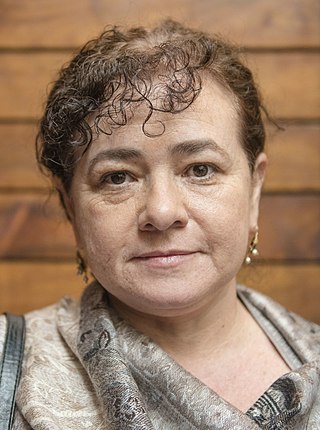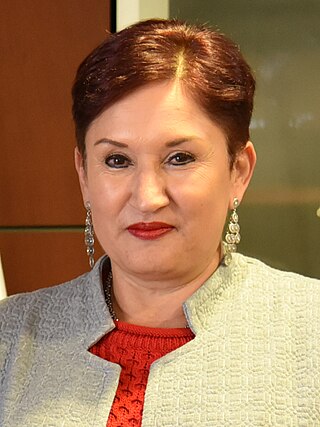Related Research Articles
Politics of Guatemala takes place in a framework of a presidential representative democratic republic, where by the President of Guatemala is both head of state, head of government, and of a multi-party system. Executive power is exercised by the government. Legislative power is vested in both the government and the Congress of the Republic. The judiciary is independent of the executive and the legislature. Guatemala is a Constitutional Republic.

José Efraín Ríos Montt was a Guatemalan military officer, politician, and dictator who served as de facto President of Guatemala from 1982 to 1983. His brief tenure as chief executive was one of the bloodiest periods in the long-running Guatemalan Civil War. Ríos Montt's counter-insurgency strategies significantly weakened the Marxist guerrillas organized under the umbrella of the Guatemalan National Revolutionary Unity (URNG) while also leading to accusations of war crimes and genocide perpetrated by the Guatemalan Army under his leadership.

Óscar José Rafael Berger Perdomo is a Guatemalan businessman and politician who served as the 46th president of Guatemala from 2004 to 2008. He previously served as mayor of Guatemala City from 1991 to 1999.

Óscar Humberto Mejía Víctores was a Guatemalan military officer and politician who served as the Head of Government from August 1983 to January 1986. A member of the military, he was head of state during the apex of repression and death squad activity in the Central American nation. When he was minister of defense, he rallied a coup against President Ríos Montt, which he justified by declaring that religious fanatics were abusing the government. He allowed for a return to democracy, with elections for a constituent assembly being held in 1984, followed by general elections in 1985.
In 1994 Guatemala's Commission for Historical Clarification - La Comisión para el Esclarecimiento Histórico (CEH) - was created as a response to the thousands of atrocities and human rights violations committed during the decades long civil war that began in 1962 and ended in the late 1990s with United Nations-facilitated peace accords. The commission operated under a two-year mandate, from 1997 to 1999, and employed three commissioners: one Guatemalan man, one male non-national, and one Mayan woman. The mandate of the commission was not to judge but to clarify the past with "objectivity, equity and impartiality."

A truth commission, also known as a truth and reconciliation commission or truth and justice commission, is an official body tasked with discovering and revealing past wrongdoing by a government, in the hope of resolving conflict left over from the past. Truth commissions are, under various names, occasionally set up by states emerging from periods of internal unrest, civil war, or dictatorship marked by human rights abuses. In both their truth-seeking and reconciling functions, truth commissions have political implications: they "constantly make choices when they define such basic objectives as truth, reconciliation, justice, memory, reparation, and recognition, and decide how these objectives should be met and whose needs should be served".
Human Rights in Mexico refers to moral principles or norms that describe certain standards of human behaviour in Mexico, and are regularly protected as legal rights in municipal and international law. The problems include torture, extrajudicial killings and summary executions, police repression, sexual murder, and, more recently, news reporter assassinations.
Impunity is the ability to act with exemption from punishments, losses, or other negative consequences. In the international law of human rights, impunity is failure to bring perpetrators of human rights violations to justice and, as such, itself constitutes a denial of the victims' right to justice and redress. Impunity is especially common in countries which lack the tradition of rule of law, or suffer from pervasive corruption, or contain entrenched systems of patronage, or where the judiciary is weak or members of the security forces are protected by special jurisdictions or immunities. Impunity is sometimes considered a form of denialism of historical crimes.
The International Commission against Impunity in Guatemala was an international body charged with investigating and prosecuting serious crime in Guatemala. On January 7, 2019, the agreement between the United Nations and Guatemala was terminated by Guatemalan president Jimmy Morales, evoking CICIG's alleged participation in illegal acts, abuse of authority and acts against the constitution. The UN rejected this unilateral termination, and the country's highest law court ruled against the president's decision. CICIG's term was scheduled to end in September 2019. Morales' decision, approved by the country's business elite, triggered an institutional crisis in Guatemala, as the Constitutional court sided with CICIG. Morales is being investigated concerning his campaign financing.
Francisco Dall'Anese Ruiz was the Attorney-General of Costa Rica.
In July 2005, in an abandoned warehouse in downtown Guatemala City, Guatemala, delegates from the country's Institution of the Procurator for Human Rights uncovered, by sheer chance, a vast archive detailing the history of the defunct National Police and its role in the Guatemalan Civil War. Over five rooms full of files containing names, address, identity documents, were brought to light.

Claudia Paz y Paz Bailey is a Guatemalan attorney who served as the first female attorney general of Guatemala, from 2010 to 2014. A former judge and litigator, Paz y Paz made unprecedented strides in the prosecution of organized crime, corruption, and human rights violations.

Iris Yassmin Barrios Aguilar is a judge and the president of one of Guatemala’s two High Risk Court Tribunals. She was the presiding judge in the case of Efraín Ríos Montt, a former dictator of Guatemala. In that trial Montt was found guilty of the genocide of indigenous Ixil Mayans; the verdict came in 2013. The trial was the first time a national judiciary tried a former head of state for genocide in his home country. However, on May 20, 2013, the Constitutional Court of Guatemala overturned the conviction, voiding all proceedings back to April 19 and ordering that the trial be "reset" to that point, pending a dispute over the recusal of judges. Officials have said that Ríos Montt's trial will resume in January 2015.
Almudena Bernabeu is an international attorney, writer and co-founder and director of Guernica37 International Justice Chambers, Almudena Bernabeu was the director of the Transitional Justice Program at the Center for Justice and Accountability (CJA) until 2017. She is the winner of the 2015 Letelier-Moffitt Human Rights Award.

Thelma Esperanza Aldana Hernández is a Guatemalan jurist and politician who served as President of the Supreme Court from 2011 to 2012 and as attorney general from 2014 to 2018.

Corruption in Ecuador is a serious problem. In 2014, the U.S. Department of State cited Ecuador's corruption as a key human-rights problem. According to Freedom House, "Ecuador has long been racked by corruption", and the weak judicial oversight and investigative resources perpetuate a culture of impunity.
The Guatemalan Peace Process was a series of negotiations occurring from 1994 to 1996, to resolve the Guatemalan Civil War.
The following lists events in the year 2018 in Guatemala.

María Consuelo Porras Argueta is a Guatemalan attorney who has been serving as the attorney general of Guatemala since 2018. She previously served as Deputy Magistrate of the Constitutional Court from 2016 to 2018. President Jimmy Morales nominated Porras as the new Attorney General and Chief of the Public Prosecutor's Office in May 2018, succeeding Thelma Aldana.

Iván Velásquez Gómez is a Colombian jurist and diplomat. From October 2013 to September 2019, he was the head of the International Commission against Impunity in Guatemala (CICIG). In August 2022, he took office as Minister of National Defence under President Gustavo Petro.
References
- ↑ "Guatemala | Country Page | World | Human Rights Watch". www.hrw.org.
- ↑ "Eight Military Officers to Stand Trial in CREOMPAZ Grave Crimes Case". International Justice Monitor. June 17, 2016.
- ↑ "Human rights in Guatemala". Amnesty International.
- 1 2 "International Commission against Impunity in Guatemala". CICIG (International Commission against Impunity in Guatemala) (in European Spanish). 2018-03-05. Retrieved 2018-10-19.
- 1 2 Pallister, Kevin (2017). "Guatemala: The Fight for Accountability and the Rule of Law". Revista de Ciencia Política (Santiago). 37 (2): 471–492. doi: 10.4067/s0718-090x2017000200471 . ISSN 0718-090X.
- ↑ "Former Guatemalan dictator Efraín Ríos Montt dies while facing genocide charges". NBC News. Retrieved 2018-11-22.
- ↑ "CICIG (International Commission against Impunity in Guatemala) | Department of Political Affairs". www.un.org. United Nations. Retrieved 2018-10-19.
- 1 2 3 Group, International Human Rights Law (1990). "Review of Maximizing Deniability: The Justice System and Human Rights in Guatemala". Human Rights Quarterly. 12 (1): 180–181. doi:10.2307/762176. JSTOR 762176.
- 1 2 3 "World Report 2018: Rights Trends in Guatemala". Human Rights Watch. 2018-01-05. Retrieved 2018-10-18.
- ↑ "Guatemala: Attorney General's Reappointment Threatens Rights". Human Rights Watch. Retrieved 19 May 2022.
- ↑ Human Rights Watch (2018-01-05), "Guatemala: Events of 2017", English, retrieved 2023-12-27